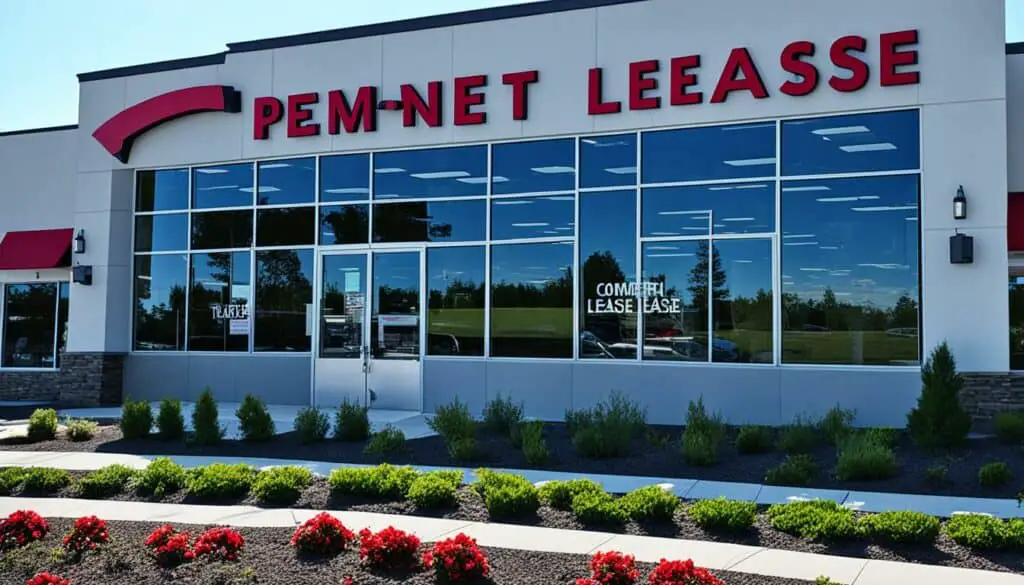The Financial Advantages of NNN Leases for Tenants
Disclaimer: This post may contain affiliate links. These links, if used and purchases made, we may earn a small commission. These affiliate programs do not impact the recommendations we make or the resources we refer you to. Our focus is on providing you the best resources for your nonprofit journey.
Are you tired of high rent prices eating into your business’s profits? What if there was a way to significantly reduce your monthly lease costs without compromising on the quality of your space? Enter the world of triple net leases, where tenants can enjoy a range of financial benefits that can make a real difference to their bottom line.Triple net leases, also known as NNN leases, are a type of commercial lease agreement that requires tenants to assume responsibility for paying all property expenses, including real estate taxes, building insurance, and maintenance. In addition to rent and utilities, tenants are also responsible for these ongoing expenses, which can result in lower monthly rents compared to traditional lease agreements.
But it’s not just about lower costs. Triple net leases offer tenants greater control over their space and expenses. With the ability to customize and maintain the property according to their specific needs and preferences, tenants can ensure their space reflects their brand identity while also having control over the costs they pay, such as electricity and water.
So, how exactly do triple net leases benefit tenants financially? What are the advantages and considerations that tenants need to be aware of? In this article, we’ll take a closer look at the financial advantages of NNN leases for tenants, the responsibilities involved, and how they compare to other types of net leases. By the end, you’ll have a better understanding of whether triple net leases are the right option for your business.
Key Takeaways:
- Triple net leases offer tenants the opportunity to lower their monthly rent compared to traditional lease agreements.
- Tenants have greater control over their space and expenses, allowing for customization and brand uniformity.
- Triple net leases require tenants to assume responsibility for property expenses such as real estate taxes, building insurance, and maintenance.
- Tenants should weigh the advantages against the potential risks, such as assuming property tax and maintenance costs.
- Investors have also found triple net leases to be an attractive option due to their low-risk nature and steady income potential.
What Is a Triple Net Lease (NNN)?
A triple net lease (NNN) is a lease agreement commonly found in commercial real estate. In this type of lease, the tenant assumes responsibility for paying all the expenses related to the property, including real estate taxes, building insurance, and maintenance. These expenses are additional to the cost of rent and utilities.
Triple net leases offer tenants more control over the property’s maintenance and costs. They provide an opportunity for tenants to have a say in the management and upkeep of the property. By assuming ongoing property expenses, tenants can enjoy lower monthly rents compared to other net lease types, such as single net leases and double net leases.
To better understand the differences, here is a comparison of the different net lease types:
| Lease Type | Tenant Responsibilities | Rent |
|---|---|---|
| Triple Net Lease (NNN) | Property expenses (taxes, insurance, maintenance) | Lower due to tenant assuming expenses |
| Single Net Lease | Property taxes | Higher than triple net lease |
| Double Net Lease | Property taxes and insurance | Higher than triple net lease |
As seen in the table above, triple net leases provide tenants with greater financial advantages by allowing them to take on the expenses that would typically be the responsibility of the property owner.
Now that we’ve covered what a triple net lease is and how it compares to other net lease types, let’s dive deeper into the advantages that triple net leases offer for tenants in the next section.

Advantages of Triple Net Leases for Tenants
Advantages of Triple Net Leases for Tenants
Tenant advantages in triple net leases are numerous, offering greater control over the property and financial benefits. Let’s explore the key advantages that tenants can enjoy:
1. Control Over Property
Generally, triple net leases give tenants full control over the maintenance, upkeep, and appearance of the property. This control allows for customization and brand uniformity, enabling tenants to create a space that aligns with their unique vision and identity. Whether it’s implementing specific design elements or optimizing the layout for optimal efficiency, tenants have the freedom to shape the property according to their needs.
2. Lower Monthly Rent
One of the biggest advantages of triple net leases for tenants is the potential for lower monthly rents. By assuming responsibility for ongoing expenses such as property taxes, building insurance, and maintenance, tenants can negotiate lower rents compared to traditional lease agreements. This financial benefit allows tenants to allocate their resources more effectively and invest in other areas of their business.
3. Direct Control over Costs
In a triple net lease, tenants have direct control over the costs they pay, including utilities such as electricity and water. This control enables tenants to manage their expenses efficiently, optimizing energy usage and selecting cost-effective service providers. Additionally, tenants have the freedom to choose their preferred insurance carrier and can protest taxes if necessary, further enhancing their control over costs.
4. Long-Term Stability
Triple net leases often come with long-term lease terms, ranging from 10 to 15 years. This stability provides tenants with the assurance of a secure location for their business operations. The long-term nature of these leases minimizes the risk of unexpected changes in rent or lease termination, allowing tenants to focus on long-term business planning and growth.

While triple net leases offer significant advantages for tenants, it’s essential to consider potential risks and drawbacks. Tenants assume the risk of property taxes and unexpected costs in property maintenance or tax liabilities. However, with careful consideration and comprehensive lease negotiations, the advantages of triple net leases can greatly outweigh these risks, providing tenants with greater control and cost savings.
Disadvantages of Triple Net Leases for Tenants
While triple net leases offer advantages for tenants, there are also some potential disadvantages to consider. Tenants who enter into triple net leases assume the risk of property taxes, which can fluctuate over time. If property taxes increase during the lease term, tenants may be responsible for the additional costs, impacting their financial obligations.
Another potential disadvantage is the burden of maintenance costs. Under a triple net lease, tenants are responsible for the upkeep of the property, including repairs and necessary maintenance. These costs can vary and may become unexpected expenses that tenants have to manage throughout the occupancy period.
In some cases, landlords may overestimate the operating costs when determining the rental price. This can result in tenants overpaying for certain expenses, such as property insurance, if the actual costs turn out to be lower than initially estimated.
Tenants also need to actively manage the property, which involves investing time and effort. This could include coordinating repairs with contractors, purchasing appropriate insurance coverage, and even protesting property taxes if necessary.
Overall, while triple net leases offer tenants control over property management, they also come with potential risks and responsibilities. Tenants should carefully evaluate these factors to ensure they are prepared for the financial obligations and challenges that may arise during the lease term.
Disadvantages of Triple Net Leases for Tenants:
- Risk of property tax increases
- Burden of maintenance costs
- Potential overpayment for certain expenses
- Time and effort required for property management
Triple Net Leases vs. Other Net Leases
When it comes to commercial real estate leases, there are various types available, including triple net leases, single net leases, and double net leases. Each type of net lease comes with its own set of obligations and advantages for both tenants and landlords. Let’s take a closer look at how triple net leases compare to other net leases.
Triple Net Lease (NNN)
In a triple net lease, tenants assume responsibility for property taxes, building insurance, and maintenance expenses in addition to rent and utilities. This type of lease offers tenants more control over the property’s maintenance and costs, resulting in lower monthly rents compared to other net leases. Triple net leases have become popular investment vehicles for their low-risk nature and steady income potential in the commercial real estate market.
Single Net Lease
Unlike triple net leases, single net leases require tenants to pay property taxes in addition to rent. However, tenants are not responsible for other property expenses such as building insurance and maintenance. Single net leases offer tenants some level of control over property costs but may result in higher monthly rents compared to triple net leases.
Double Net Lease
In a double net lease, tenants assume responsibility for property taxes and property insurance in addition to rent. However, tenants are not responsible for maintenance expenses. Double net leases provide tenants with more control over insurance costs and property taxes but may have higher monthly rents compared to triple net leases.
Here’s a side-by-side comparison of triple net leases, single net leases, and double net leases:
| Lease Type | Property Expenses Assumed by Tenant | Obligations | Monthly Rent |
|---|---|---|---|
| Triple Net Lease | Property taxes, building insurance, maintenance | Tenants have total control over property expenses. | Lower compared to single net and double net leases. |
| Single Net Lease | Property taxes | Tenants have control over property taxes. | May be higher compared to triple net leases. |
| Double Net Lease | Property taxes, property insurance | Tenants have control over property taxes and insurance. | May be higher compared to triple net leases. |
It’s important for tenants and landlords to carefully consider the obligations and advantages associated with each type of net lease before entering into an agreement. While triple net leases offer tenants more control and lower monthly rents, they also come with the responsibility of assuming property expenses. Understanding these key differences can help parties make informed decisions that align with their goals and preferences.
Conclusion
Triple net leases present compelling advantages for tenants in the realm of commercial real estate. By taking on property expenses such as real estate taxes, building insurance, and maintenance, tenants can relish in lower monthly rents and exercise greater control over the property’s upkeep and costs. However, it’s important for tenants to acknowledge the associated risks, including assuming property tax and maintenance costs. Nevertheless, the appeal of triple net leases remains strong, positioning them as enticing investment opportunities that offer stability and consistent income potential for investors in the commercial real estate market.
FAQ
What are the financial advantages of NNN leases for tenants?
NNN leases offer tenants lower rents compared to standard lease agreements, as tenants assume all property expenses, relieving landlords of ongoing financial obligations.
What is a Triple Net Lease (NNN)?
A Triple Net Lease is a lease agreement in which the tenant is responsible for paying property expenses such as real estate taxes, building insurance, and maintenance, in addition to rent and utilities.
What are the advantages of Triple Net Leases for tenants?
Triple Net Leases offer tenants control over the maintenance and costs of the property, customization and brand uniformity, and lower monthly rents.
What are the disadvantages of Triple Net Leases for tenants?
Tenants assume the risk of property taxes, maintenance costs, and potential unexpected expenses. The rental price may also overestimate operating costs, resulting in the tenant overpaying for some expenses.
How do Triple Net Leases compare to other net leases?
Triple Net Leases require tenants to assume property taxes, building insurance, and maintenance expenses, while single net leases only require tenants to pay property taxes and double net leases include property taxes and insurance.
How can investors participate in Triple Net Lease real estate?
Investors can invest in Triple Net Leases through real estate investment trusts (REITs) or by building a portfolio of high-grade commercial properties fully leased by a single tenant.
What are the tenant advantages of NNN Leases in commercial real estate?
NNN Leases offer tenants lower rents, control over property maintenance and costs, and the opportunity for customization and brand uniformity.







